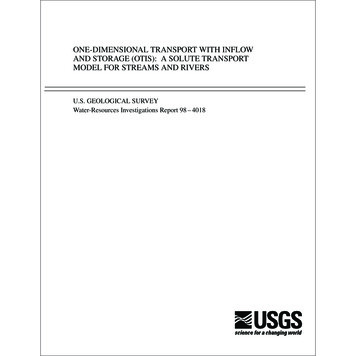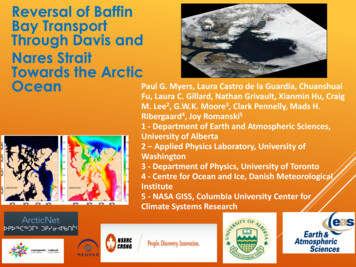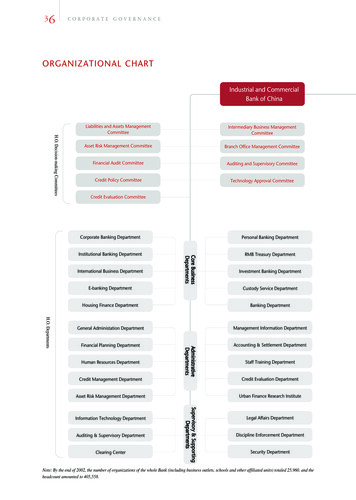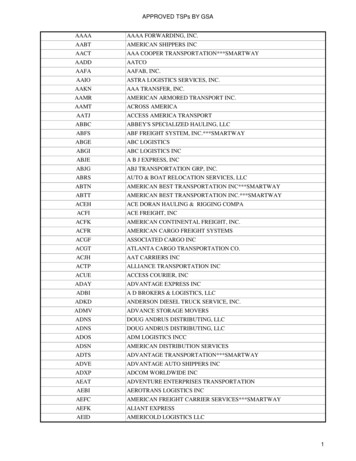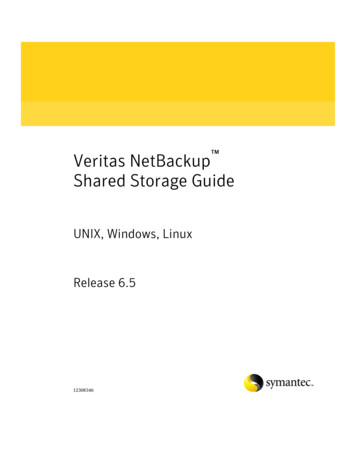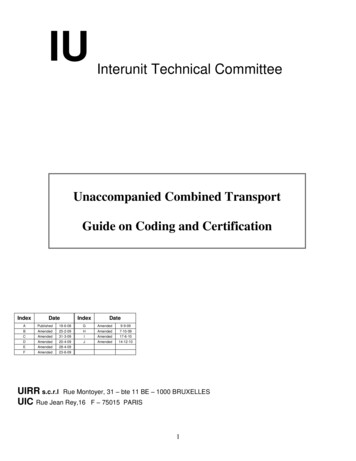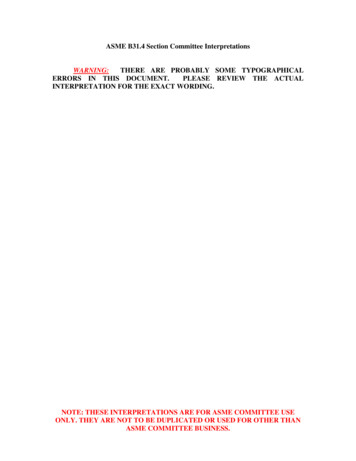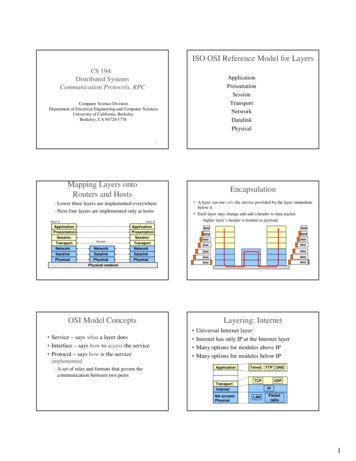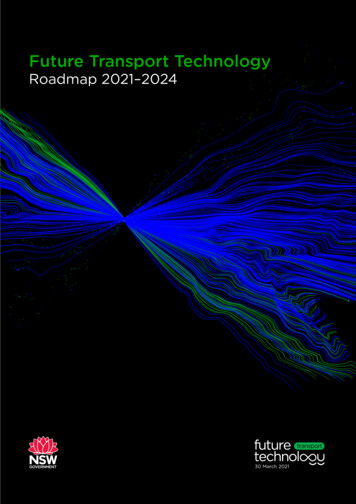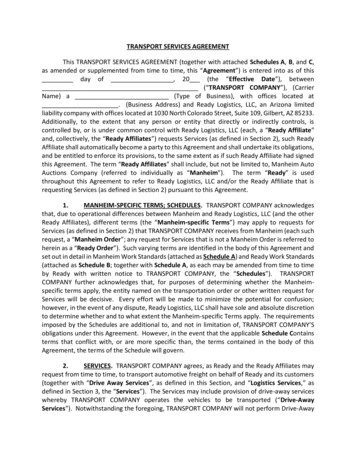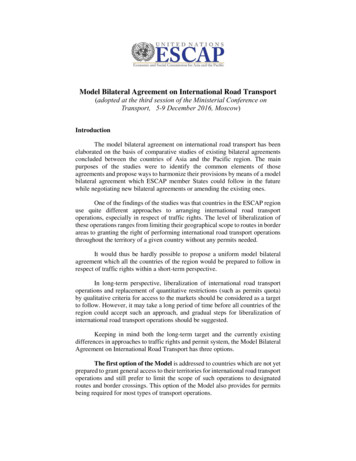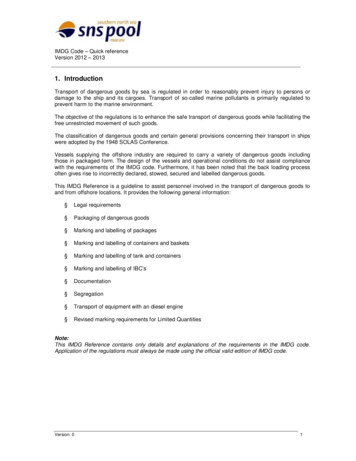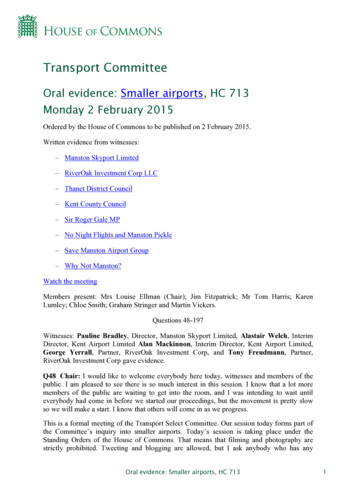
Transcription
Transport CommitteeOral evidence: Smaller airports, HC 713Monday 2 February 2015Ordered by the House of Commons to be published on 2 February 2015.Written evidence from witnesses:– Manston Skyport Limited– RiverOak Investment Corp LLC– Thanet District Council– Kent County Council– Sir Roger Gale MP– No Night Flights and Manston Pickle– Save Manston Airport Group– Why Not Manston?Watch the meetingMembers present: Mrs Louise Ellman (Chair); Jim Fitzpatrick; Mr Tom Harris; KarenLumley; Chloe Smith; Graham Stringer and Martin Vickers.Questions 48-197Witnesses: Pauline Bradley, Director, Manston Skyport Limited, Alastair Welch, InterimDirector, Kent Airport Limited Alan Mackinnon, Interim Director, Kent Airport Limited,George Yerrall, Partner, RiverOak Investment Corp, and Tony Freudmann, Partner,RiverOak Investment Corp gave evidence.Q48 Chair: I would like to welcome everybody here today, witnesses and members of thepublic. I am pleased to see there is so much interest in this session. I know that a lot moremembers of the public are waiting to get into the room, and I was intending to wait untileverybody had come in before we started our proceedings, but the movement is pretty slowso we will make a start. I know that others will come in as we progress.This is a formal meeting of the Transport Select Committee. Our session today forms part ofthe Committee’s inquiry into smaller airports. Today’s session is taking place under theStanding Orders of the House of Commons. That means that filming and photography arestrictly prohibited. Tweeting and blogging are allowed, but I ask anybody who has anyOral evidence: Smaller airports, HC 7131
mobile devices to please put them to silent. It is essential during our session that theCommittee is able to hear from our witnesses without any interruption from the publicgallery. If there is interruption, I will have to ask the doorkeepers to clear the public gallery. Ido not anticipate that that will be necessary because I am sure everybody has come here tolisten to what is being said. You might also be interested to know that a transcript of today’ssession will be published online by the end of the week, so you will be able to read exactlywhat has been said.I now turn to our witnesses. Would each witness please give their name and organisation forour records?Tony Freudmann: I am Tony Freudmann from RiverOak.George Yerrall: I am George Yerrall from RiverOak.Alastair Welch: I am Alastair Welch, an interim director of Kent Airport Limited.Pauline Bradley: I am Pauline Bradley, director of Manston Skyport.Alan Mackinnon: I am Alan Mackinnon, interim director of Kent Airport Limited.Q49 Chair: Thank you very much. Ms Bradley, how much did Manston Skyport pay Infratilto purchase Manston airport in November 2013?Pauline Bradley: The consideration we paid was 1.Q50 Chair: One pound?Pauline Bradley: Yes.Q51 Chair: What happened to the airport’s debts? Were they factored into that at all? Howwere they dealt with?Pauline Bradley: The transaction that we agreed with Infratil was that, although we paid 1 for the shares in the company, we in fact inherited the running costs of the business. Ineffect, the day after we paid 1 we became responsible for all costs and all losses inrelation to the airport.Q52 Chair: How much was involved?Pauline Bradley: By the time we made the decision to close the airport the losses incurredat the airport were about 4.5 million.Q53 Chair: Were any debts written off at that stage?Alan Mackinnon: Could I answer that? Prior to the acquisition of the airport by ManstonSkyport, Infratil—the then owners—capitalised 55 million of intra-group loans. Theyconverted them from loans to share capital.Q54 Chair: Ms Bradley, the Manston Skyport written evidence which the Committee hasreceived states that you “cut short your due diligence work” before purchasing the airport.When you took control of the airport in November 2013 was the financial situation worsethan you had anticipated?Oral evidence: Smaller airports, HC 7132
Pauline Bradley: When we took control of the airport at that time we had not bottomedout what the expected financial loss position would be. The reason we had not been able todo that was that Infratil had made it very clear to us towards the end of that year that wehad a very short period of time to make a decision on Manston airport in particular. Frommemory, they gave us one month to make a decision as to whether or not we proceededwith the purchase of Manston, so we had no time, under those circumstances, to completethe due diligence on forward losses at Manston. We had done quite a significant amount ofwork, but the real problem that we and our advisers had at that time was that themanagement information given to us when we first started to review the airport as anopportunity, in terms of the losses that management were projecting at the time, was quitedifferent some months down the line, because the trading performance of the airport haddeteriorated. To give you an example—Q55 Chair: Let me go back to the question I am putting to you. Was the financial situationworse than you anticipated?Pauline Bradley: Yes.Q56 Chair: Do you think that Infratil maximised profitability at Manston? Could they havedone it better?Pauline Bradley: Certainly in a number of conversations that we had early in the process,parties close to the situation at Manston had confided in us that they had some concernsthat Manston had suffered as a result of the remote ownership and management of theprevious owner Infratil, who was based in New Zealand. As a result, there was a beliefthat opportunities to grow the business at Manston had been missed.Q57 Chair: Did you think that they had an effective business plan?Pauline Bradley: I do not think I could fully answer the question today, simply because itis a long time since we looked at—Q58 Chair: But surely that cannot be the case, can it? This was the purchase of a veryimportant asset. I am asking you the question: did you think that the operators had aneffective business plan? It is not about remembering, is it? Did you think that or didn’t you?Pauline Bradley: We believed that the strategy the operators had was the correct strategyin terms of trying to grow the revenue at Manston. What I was trying to explain was that,anecdotally, although they had a strategy to try to enhance the revenue, they did not haveenough of a presence on the ground to be able to maximise opportunities to do that.Q59 Chair: Your written evidence, if I can go back to it again, also refers to what you call“a highly regarded chartered accountant who had worked on numerous turnaround strategies”and “an industry professional with extensive aviation experience”. Was that a reference to MrMackinnon and Mr Welch?Pauline Bradley: Yes, it was.Q60 Chair: Mr Welch, looking at your track record, you have a great deal of experience inthe aviation industry, but did you genuinely believe that the Airports Commission wouldrecommend no new runway construction in the south-east, that BA would shift its cargoOral evidence: Smaller airports, HC 7133
operation to Manston and that Ryanair would base itself at Manston? Given the knowledgeyou have of the aviation sector, did you seriously believe those things?Alastair Welch: There are three different questions you ask there. In terms of the AirportsCommission, ultimately it will be very interesting to see what has happened. I think theirinitial findings surprised a number. There is—Q61 Chair: Mr Welch, I am not asking you for a commentary on the findings. Did yougenuinely believe at that early time that the commission was likely to recommend noexpansion at major airports in the south-east? Did you really believe that was likely?Alastair Welch: We believed there was certainly a possibility that no incremental runwaysin the south-east could be a recommendation, yes.Q62 Chair: Do you know anybody else who thought that?Alastair Welch: Many; yes.Q63 Chair: Really? Did you think that BA was going to shift its cargo operation toManston? What led you to think that?Alastair Welch: The executive team at Manston previously had been very close to gettingBritish Airways to migrate their cargo operation from Stansted. They went to main boardand it stayed at Stansted at that point. It was up for renewal or review in early 2014. Theexecutive team at the airport were confident that they had a very good chance of securingit for Manston.Q64 Chair: Did it look likely that Ryanair was going to base itself at Manston?Alastair Welch: Perhaps Ms Bradley can answer that better than I can because there wereconversations, before purchase took place, with Michael O’Leary.Q65 Chair: Ms Bradley, was that a likely proposition?Pauline Bradley: I believe at the time we made the decision to acquire the airport that thatwas a likely outcome. If I can just explain, Ann Gloag and I met twice with MichaelO’Leary and Michael Cawley at Ryanair to try to persuade them to consider Manston as abase and perhaps to use Manston to operate some of what are called “sunshine flights” tothe southern parts of Europe. I have to say that when we first went to see them they hadnot heard very much, if anything at all, about Manston, and that reinforced our belief thatperhaps Infratil were just too remote to capture opportunities there.However, they did consider Manston. They sent someone down to have a look at it. I thinkTony was involved at that stage. They came back with a very positive review at that stagefor Ryanair. That led to Michael O’Leary allowing us access to his senior routes planner tobegin to discuss what those routes would be, how many times a week they would go andwhat the passenger numbers would be. At the time we made the decision to acquire theairport, we were talking to Ryanair about five routes that would initially have brought anadditional 85,000 passengers to Manston. By 2019 that would have increased to 300,000.There was a real, credible opportunity to do business with Ryanair at that time.Oral evidence: Smaller airports, HC 7134
Q66 Chair: Let me go to what happened about the purchase and disposal of Manston. Youannounced the closure of the airport in March 2014, less than four months after the purchase.When was the decision to close taken—or your intention to close?Pauline Bradley: The intention to close the airport was as a result of the review that theinterim executives had carried out. They were asked to report—Q67 Chair: When?Pauline Bradley: They reported to the shareholders at the end of February as to what theoptions were for the airport going forward.Q68 Chair: How long was that after the airport was purchased?Pauline Bradley: Four months.Q69 Chair: Don’t you think it sounds a little strange, after your confidence—the way youput it to us today—about Mr Welch’s comments that all these very positive things were goingto happen, that within four months there was the decision to close it?Pauline Bradley: The reason for that is that a number of things happened in a very shortperiod of time. Probably the most serious for Manston was that Ryanair, by the beginningof 2014 and after two profits warnings, had reviewed their operational strategy and cometo the conclusion that airports like Manston were exactly not what they wanted in terms oftheir business going forward. Therefore, as a result, Ryanair withdrew from ourdiscussions. That was not something we could have foreseen at the time. Ryanair, ineffect, pulled out.Obviously in relation to the BA cargo that you referred to, BA changed their strategy oncargo. Some of the cargo operators that we had spoken to in terms of bringing business toManston were affected by things such as “No Night Flights”, and therefore we could notattract business for that reason. The whole strategy around cargo in terms of the aviationindustry was under review. Most cargo was being carried in the belly of planes. The mainareas we identified early on to improve the revenue at Manston, to give us a chance ofturning it around within a very short period of time, no longer existed.Q70 Chair: Within four months you went from seeing it as a place where there could bemajor developments with some confidence to deciding that you would have to close it. Am Icorrect in saying that?Pauline Bradley: Yes.Q71 Chair: The airport closed on 15 May 2014. When did you sell off the assets, such asthe emergency equipment and the runway lighting? When were those sold off?Alastair Welch: The key piece to set out is that it was what we would call an orderlyclosure, by which we mean a solvent closure; creditors were paid and staff were maderedundant, and obviously paid by the company, and as part of that what then followedwere the mechanical assets. Things with wheels and so on were sold around three or fourmonths after that. Some of the other items were sold beyond that.Oral evidence: Smaller airports, HC 7135
Q72 Chair: Could you clarify for me when the aviation assets, such as emergencyequipment and runway lighting, were sold off?Alastair Welch: I do not think the runway lighting has actually been sold, to myknowledge.Q73 Chair: Has it been sold?Alastair Welch: Certainly it was available for sale. I do not think it has value, to be honest.There was a process of sale which ran until roughly September/October last year.Q74 Chair: I want to know when these particular pieces of equipment were sold off. Whenwas the emergency equipment sold off?Alastair Welch: If it is helpful, might I suggest that we could write to you with a schedulebreaking that down so we can be correct?Q75 Chair: Yes. We want to know when the emergency equipment and runway lightingwere sold off. We have heard that RiverOak attempted to purchase the airport in April 2014following the closure announcement. How much did they offer?Pauline Bradley: I can answer that. The original offer from RiverOak was a verbal offer.It was made to me and Ann Gloag. The original offer was to give us our money back. Thatwas the quote.Q76 Chair: How much was offered?Pauline Bradley: The offers ranged from the initial offer of giving us back our money.There was then a verbal offer—Q77 Chair: How much would that be?Pauline Bradley: My interpretation of that at the time was that they were going to pay usthe 1 that we had paid Infratil. The offer was increased to around 2 million or 2.5million verbally, and offers after that started to come in writing.Q78 Chair: RiverOak, would you like to comment on that?George Yerrall: We offered 5 million, 6 million and ultimately 7 million in the spaceof two or three weeks.Tony Freudmann: In writing.Q79 Chair: It was in writing. Ms Bradley, this is something very different. How can therebe such a discrepancy?Pauline Bradley: I do not think it is different. In the original conversations with RiverOak,when they came up to Scotland to visit Ann Gloag and myself—in fact, I think TonyFreudmann was present at that meeting—the offers were made verbally. There was averbal offer made that day, which was to give us our money back. When that was rejected,the offer was increased at the same meeting to around 2 million or 2.5 million. I do notremember which it was. That meeting then ended, and Mr Freudmann, Niall Lawlor andanother gentleman left. The same day we had a telephone conversation to increase theOral evidence: Smaller airports, HC 7136
offer to, I believe, either 3 million or 4 million. When the offers started to come inwriting, then Mr Yerrall is correct that we had written offers of 5 million, 6 million and 7 million.Q80 Chair: So the answer to my question is that you had an offer of how many million?Pauline Bradley: The initial offer—Q81 Chair: No; I am asking what the offer was from RiverOak.Pauline Bradley: The offer ranged from 1 to 7 million.Q82 Chair: RiverOak, do you have evidence of the offers you made?George Yerrall: Yes, they are in writing. We have copies of the letters if you would likethem.Q83 Chair: Yes. What was the amount of the offer that you made?George Yerrall: The highest offer was 7 million. We were rejected at 4 million. Wewere rejected at 5 million. We ultimately offered 7 million, which we were told was theasking price.Q84 Chair: Ms Bradley, do you accept that? Are you disputing what RiverOak are sayingthey offered you and that you rejected?Pauline Bradley: I do agree that the asking price was 7 million. I certainly do not agreethat that was the offer we received from RiverOak. The offer we received was a highlyconditional offer, and one of the conditions was that RiverOak would take ownership ofthe 2 million that sat in our bank account, so it was never a 7 million offer.Q85 Chair: Would it be the case that you were aware at that point that the land was worth agreat deal more as a development opportunity than it was as an airport, and that might haveaffected your decision?Pauline Bradley: I am not aware that we actually thought about it in those terms. Thedecision we took was not affected by what we thought the land might ultimately have beenworth. The decision we took around RiverOak was for two reasons. The first reason wasthat we entered into discussions with RiverOak in good faith; in truth, we saw them at thatstage as being, of all the parties that had been introduced to us as buyers of the airport, acredible buyer for the airport, and we were optimistic in our early discussions with them.One of the things we asked of RiverOak very early on, before we got into much of thedebate around price at all, was that any communication between us was kept private andconfidential until we agreed the deal. At that point, we would have had no issue withanyone in the public domain being aware of it. But we had just come through a verydifficult experience with a previous cash buyer that apparently was going to buy theairport, pay the money and do the deal in a very short period of time. We were goingthrough a consultation process with staff at that time and it was extremely difficult forthem and for the interim team, because their hopes were raised and then the cash buyer didnot materialise. We explained all that to RiverOak and said, “Look, it is really important tous that we have this private and confidential arrangement, after which we have no issue.”Oral evidence: Smaller airports, HC 7137
Unfortunately, within a short period of time, written communication from RiverOak toourselves started to appear in the public domain. In fact, we heard twice from our ownstaff at Manston that an offer was coming from RiverOak; on one occasion they could tellus that it was a knock-out offer. We had other people calling our office from the media inThanet to tell us that another offer was coming, and that they had seen an offer. In effect,on something we had asked to stay private and confidential, third parties were aware of theoffers and, in some cases, had seen the offers before we did. We just lost trust inRiverOak. It was a complete—Q86 Chair: But losing trust is very different from disputing the fact—whether there was orwas not an offer. Let me take you back to the written evidence that we received from you. Itincludes the following sentence: “In September 2014, Manston Skyport sold the site toregeneration specialists.” Is that a reference to Mr Cartner and Mr Musgrave?Pauline Bradley: Yes, it is.Q87 Chair: You sold the site to them. Are they the current owners of the airport?Pauline Bradley: They are. They are the majority—Q88 Chair: They are the current owners of the airport. Did Manston Skyport Limitedmaintain an interest in the former Manston airport?Pauline Bradley: Yes, it did.Q89 Chair: Who owns it then? Mr Cartner and Mr Musgrave are the owners. ManstonSkyport, you agree, retains an interest. Can you tell us the nature of that interest?Pauline Bradley: The majority of the share capital of that business—as in 80% of theshare capital of that business—is owned by Mr Musgrave and Mr Cartner. We have aminority interest in
RiverOak Investment Corp gave evidence. Q48 Chair: I would like to welcome everybody here today, witnesses and members of the public. I am pleased to see there is so much interest in this session. I know that a lot more members of the public are waiting to get into the room, and I
